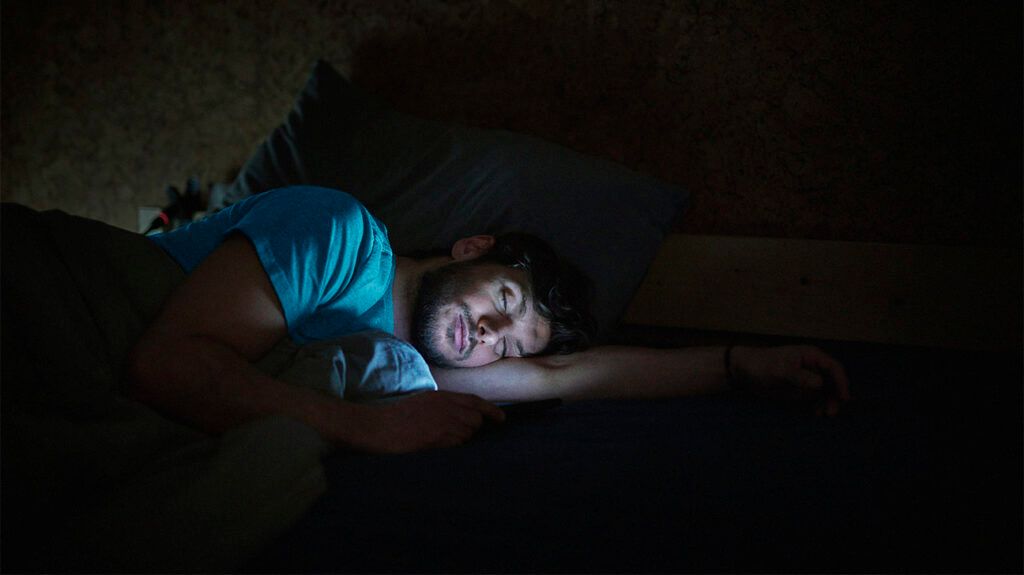Tinnitus may worsen when lying down at night for some people. The reason for this is not always apparent, but a potential cause includes being in a quieter sleep environment with fewer distractions from the noise.
Tinnitus involves hearing a sound that is usually not audible to other people. The causes of tinnitus vary and are often unclear. However, many people who experience it also live with some level of hearing loss.
Tinnitus can take many forms, including ringing, whooshing, hissing, or squealing. Chronic tinnitus is a sound that persists for 3 months or longer.
This article discusses why tinnitus may worsen when a person lies down, how to stop ears from ringing when lying down, the best sleeping position for tinnitus, and when to speak with a doctor.

For some people, tinnitus may worsen or become more noticeable when lying down. Research into this is limited, but there are several possible explanations.
If the increased tinnitus volume occurs at night when it is time to sleep, it may be because the person is in a quieter environment, making the tinnitus more noticeable. They may also have fewer distractions to take their attention off the noise.
Another possible reason for tinnitus to worsen when a person lies down may be positional changes that cause increases in intracranial pressure (ICP).
According to a 2018 study, tinnitus is a potential symptom of idiopathic intracranial hypertension (IIH), which
IIH is only one of multiple possible causes of tinnitus. A person with typical intracranial pressure levels may also experience tinnitus.
However, this link between IIH and tinnitus may explain why some people’s tinnitus worsens when lying down. A 2015 research study indicates that ICP is higher when people lie down than when they are sitting or standing.
Circadian rhythms may also influence the volume of tinnitus a person experiences when lying down. According to a
While tinnitus has
- Sound therapy devices: Devices like hearing aids can
restore auditory input, which reduces tinnitus volume. - Behavioral therapies: Healthcare professionals
may recommend treatments such as cognitive behavioral therapy (CBT), tinnitus retraining therapy, and neurobiofeedback. - Medications: Doctors may prescribe diazepam (Valium), gabapentin (Neurontin), and melatonin to treat tinnitus.
Doctors sometimes prescribe medications for anxiety and depression to treat tinnitus. Lifestyle measures aimed at reducing stress and supporting mental health may also help reduce the effect of tinnitus.
Treatments and lifestyle support may reduce the perception of tinnitus volume, making it easier to live with when a person is lying down.
If increased ICP is the reason a person’s tinnitus worsens when they lie down, elevating their head when lying down may help. People could use extra pillows or an inclined bed to achieve this.
People with vascular pulsatile tinnitus may find that tinnitus volume is lower when their head is
If tinnitus seems louder when lying down due to a lack of distractions, a person’s sleeping position may have less influence than using devices such as a white noise machine.
There are several types of tinnitus, so contacting a doctor can provide a person with a diagnosis and tips for managing the sound they hear.
Tinnitus can sometimes be a sign of an underlying condition that needs treatment. For instance, pulsatile tinnitus, which may be in sync with the person’s heartbeat, can indicate vascular issues, such as an aneurysm or IIH.
Unilateral tinnitus is tinnitus that occurs on one side only. Possible causes include ear drum perforation, earwax blockage, and infection.
Insomnia occurs in
Tinnitus involves a sound in the ears, such as a ringing or roaring, that is usually not audible to other people. It has a range of causes, such as hearing loss, infection, and vascular issues.
Some people may find tinnitus more noticeable when they are lying down. This may be due to increased pressure in their head or the fact that their environment is quieter, so they notice the tinnitus more.
A person may see their doctor if tinnitus occurs in one ear, if it pulses, or if it interferes with their daily life.
